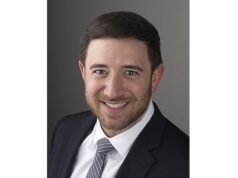
A prominent surgeon-scientist and Society for Vascular Surgery (SVS) member is the 2024 recipient of the American Heart Association (AHA) Joseph A. Vita Award, which recognizes published work that has had a transformative impact on basic, translational or clinical cardiovascular research.
Through the Gallagher Lab, Katherine Gallagher, MD, and her team of researchers have become a fixture in the translational vascular science space, producing a prodigious output of research and publications.
Her lab, based at the University of Michigan in Ann Arbor, has also produced several SVS Foundation James S.T. Yao Resident Research Award recipients in recent years, including the most recent: University of Michigan integrated vascular surgery resident, Kevin D. Mangum, MD.
Gallagher spoke of her honor at receiving the landmark award, telling Vascular Specialist her interest in translational research was embedded early on.
“I’ve always had an interest in immunology and how immune cells influence the vascular system—both a healthy system and one with disease—and have always been interested in looking at it from a more a translational research standpoint,” says the University of Michigan professor of surgery, microbiology and immunology. “In the last 10–12 years, there has been a lot more interest in the immune system and the role that it plays in vascular diseases, as well as the development of various immune therapies. I’ve had an interest in how we can try to manipulate these immune cells, which are very inflammatory in vascular disease, and then try to reverse this inflammation.”
Gallagher arrived at Michigan as a junior scientist 15 years ago, starting her lab with just one other team member. It has since grown to include between 15–20 colleagues, with its research interest morphing from tissue regeneration and metabolic disease to, now, a full spectrum of cardiovascular diseases, including aneurysmal, atherosclerotic and COVID-19-related impacts on vascular disease.
She is particularly proud of her lab’s success in shepherding the next generation of vascular surgeon-scientists. “We have had lot of success with mentees, getting NIH [National Institutes of Health] grants, SVS Foundation funding, AHA awards, and so on,” Gallagher says. “That’s the part I find most exciting: the next generation and trying to get them thinking about science and translational therapies.”
She highlighted the importance of translational vascular science to the future of vascular surgery as a specialty. “A lot of the therapies we are going to see coming down the pipeline in the next 20 years are going to be immune and cell-based therapies. Unless vascular surgeons are involved at the forefront of research, then there is less bench-bedside translation, which hurts vascular patients. So, it is really important for vascular surgeons to be involved in translational research in order to allow our patients to benefit from the latest, greatest, innovative treatments.”
To that end, her lab’s focus has now turned toward how immune cells interact with other structural cells in blood vessels and pathological processes, with the aim of developing nanomedicine therapies to target those interactions, she added.












